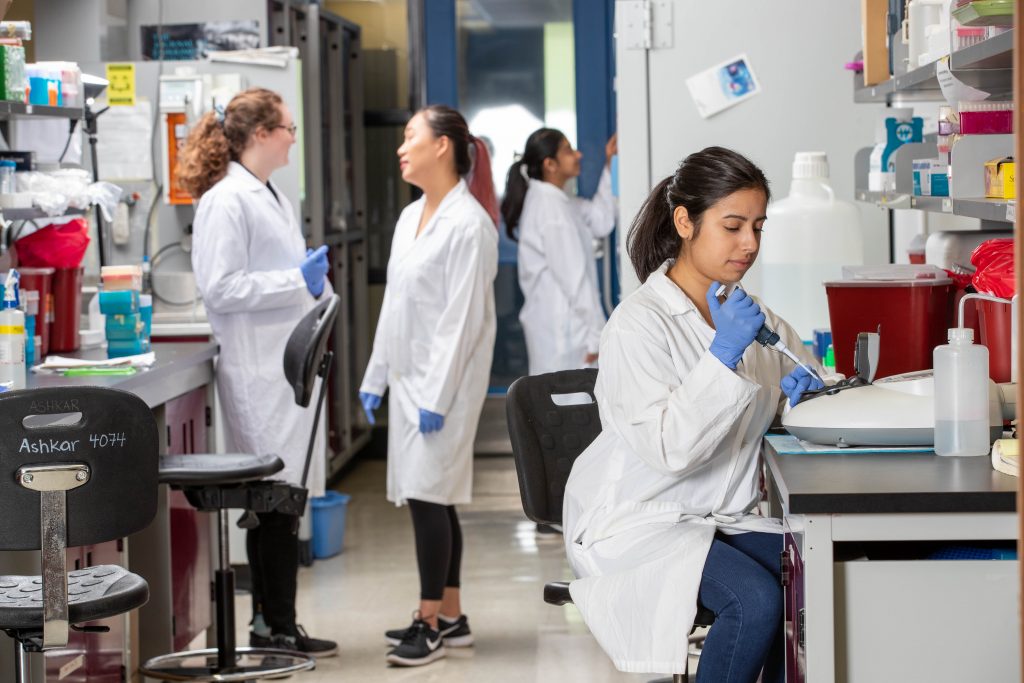Health Sciences researchers receive more than $14 million in federal funding

The CIHR Project Grant program is designed to capture ideas with the greatest potential to advance health-related fundamental or applied knowledge, health research, health care, health systems, and/or health outcomes.
BY Mike Ayers
February 15, 2024
Researchers from the Faculty of Health Sciences have been awarded more than $14 million from the Canadian Institutes of Health Research’s (CIHR) Fall 2023 Project Grant competition.
Nearly 40 Faculty of Health Sciences research teams secured critical funding to investigate solutions to a variety of issues, ranging from public health workforce planning to pneumonia treatment in emergency departments.
The Project Grant program is designed to capture ideas with the greatest potential to advance health-related fundamental or applied knowledge, health research, health care, health systems, and/or health outcomes.
“Funding for our transformative research projects enables impactful science at McMaster’s Faculty of Health Sciences. Our discoveries and innovations continue to lead to better health across our local communities and the globe,” says Jonathan Bramson, vice-dean, Research, for Health Sciences.
FHS projects awarded funding include:
Addressing Urgent Calls for Public Health Workforce Planning: Establishing and Implementing National Indicators to Profile and Monitor the Public Health Workforce in Canada ($401,625): Emily Belita, School of Nursing
Digital Chronic Pain Recommendations Map: Consolidation and Systematic Appraisal of Guideline Recommendations Regarding Management of Chronic Pain (e-ChronicPain RecMap) ($746,755): Andrea Darzi and Jason Busse, Department of Anesthesia; Gordon Guyatt and Holger Schunemann, Department of Health Research Methods, Evidence, and Impact; Stacey A Ritz, Department of Pathology and Molecular Medicine
Perioperative Anticoagulant Use for Surgery Evaluation Study Part 2 Randomized Control Trial ($845,326): James Douketis, Department of Medicine
Commercialization of a diagnostic test for endometriosis ($634,949): Mathew Leonardi, Department of Obstetrics and Gynecology
Dietary Carbohydrate Quality and Brain Health ($1,124,550): Andrew Mente, Department of Health Research Methods, Evidence, and Impact
Unraveling the role of IgA during respiratory virus infections ($914,175): Matthew Miller, Department of Biochemistry and Biomedical Sciences
Metabolic adaptation to weight loss in response to a behavioural lifestyle program with or without semaglutide in adolescents with obesity: A randomized controlled trial ($650,250): Katherine Morrison, Department of Pediatrics; Zubin Punthakee, Department of Pediatrics and Department of Medicine
Elucidating the molecular mechanism by which bat IRFs modulate antiviral responses ($937,125):Karen Mossman, Department of Medicine
Post-extubation pressures on non-invasive respiratory support in preterm neonates: A prospective comparative effectiveness research study ($367,199): Amit Mukerji and Amneet Sidhu, Department of Pediatrics
Promoting Optimal Treatment for Community-Acquired Pneumonia in Emergency Rooms (PIONEERS): a multicentre randomized controlled trial ($2,046,376): Jeffrey Pernica, Department of Pediatrics
An international repository of individual patient data to predict development of chronic post-surgical pain after knee replacement surgery ($260,101): Behnam Sadeghirad and Jason Busse, Department of Anesthesia; Farid Foroutan and Lawrence Mbuagbaw, Department of Health Research Methods, Evidence, and Impact
Postbiotics cooperate to improve metabolic disease ($1,216,350): Jonathan Schertzer, Department of Biochemistry and Biomedical Sciences
Therapeutic Relevance of Abnormal Airway Morphology in Asthma: A Path to Optimized Management and Drug Development (AirPATH Study) ($994,501): Sarah Svenningsen and Parameswaran K Nair, Department of Medicine
Characterization of a novel prostate cancer factor contactin 1 (CNTN1)-derived tumorigenesis through establishing a new transgenic mouse model for prostate cancer ($837,675): Damu Tang, Department of Surgery
Glucocorticoids or Avacopan in peopLe with high-risk renal Anti-Neutrophil cytoplasm antibody associated vasculitis Trial (GALANT) – Pilot ($520,200): Michael Walsh, Nader Khalidi, and Mats Junek, Department of Medicine
Investigating the mechanisms of disease progression in HIV/TB co-infection to design interventions for better clinical outcomes ($300,000): Amy Gillgrass, Department of Medicine
Facilitating evidence-based decision-making to combat antimicrobial resistance: development of a public, user-friendly database of the highest levels of evidence ($100,000): Romina Brignardello-Petersen, Department of Health Research Methods, Evidence, and Impact; Mark Loeb, Department of Pathology and Molecular Medicine
Creating a toolkit for trustworthy guideline development and implementation ($100,000): Wojtek Wiercioch and Holger Schunemann, Department of Health Research Methods, Evidence, and Impact
Humoral and cellular immune responses to COVID-19 vaccination and infection in older adults. ($100,000): Dawn Bowdish, Ishac Nazy, Jonathan Bramson, and Jessica Breznik Department of Medicine; Matthew Miller,Department of Biochemistry and Biomedical Sciences
Aging, Infection and Mobility (AIM): Using wearable technology to understand the long-term functional impact of COVID-19 in community-living older people ($100,000): Marla Beauchamp, School of Rehabilitation Sciences; Lauren Griffith and Jinhui Ma, Department of Health Research Methods, Evidence, and Impact
Prevention of Infections in Cardiac Surgery (PICS): a cluster-randomized factorial cross-over trial ($100,000): Dominik Mertz, Department of Medicine
Conceptualizing Maternal Morbidity by Engaging Individuals with Pregnancy Experience – an International Group Concept Mapping Study ($100,000): Rohan D’Souza and Giulia Muraca, Department of Obstetrics & Gynecology
SMARTMOVE: Validating clinically relevant mobility measures derived from wearable technology in older Canadians ($100,000): Marla Beauchamp and Julie Richardson, School of Rehabilitation Sciences
Structural Basis of Aberrant cAMP Signaling and of PKA-Targeting Therapies ($100,000): Giuseppe Melacini, Department of Biochemistry and Biomedical Sciences
Systematic single-cell characterization of coordinated RNA regulatory mechanisms underlying glioblastoma progression ($100,000): Hong Han, Department of Biochemistry and Biomedical Sciences


